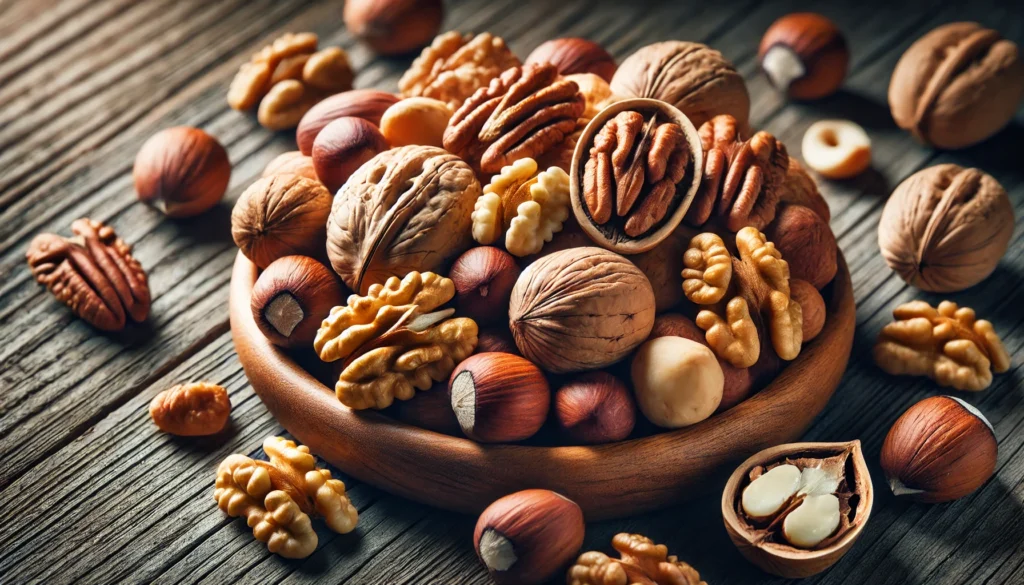The Role of Nuts in Brain Health and Cognitive Function
The relationship between diet and cognitive function has long been studied, and research consistently highlights the benefits of nutrient-dense foods in supporting brain health. Among these, nuts have emerged as a powerhouse of essential nutrients that enhance memory, concentration, and neural resilience. The best nuts for brain health contain a combination of omega-3 fatty acids, antioxidants, vitamins, and minerals that support neuronal function and reduce oxidative stress. Regular consumption of nuts good for brain function has been linked to improved cognitive performance, reduced risk of neurodegenerative diseases, and enhanced mental clarity. By incorporating a variety of brain-boosting nuts into daily nutrition, individuals can foster long-term cognitive health and optimize neural efficiency.
You may also like: How to Increase Brain Cells Naturally: Strengthening Neural Pathways for Optimal Memory & Recall
How Nuts Support Memory and Mental Clarity
Memory and mental clarity rely heavily on the brain’s ability to process and store information efficiently. The best nuts for brain health contain compounds that directly influence neurotransmitter function and synaptic plasticity. For example, walnuts, widely regarded as one of the best nuts for brain enhancement, are rich in alpha-linolenic acid (ALA), an essential omega-3 fatty acid that supports cognitive longevity. Almonds, another widely consumed nut, are packed with vitamin E, which has been shown to prevent cognitive decline. Additionally, cashews, known for their high magnesium content, play a crucial role in nerve signal transmission, further supporting cognitive clarity and recall.
The Best Nuts for Brain Health and Cognitive Longevity
When considering the best nuts for brain health, certain varieties stand out for their exceptional nutrient profiles. Walnuts, almonds, pistachios, and macadamia nuts all contain essential fatty acids, antioxidants, and polyphenols that promote brain resilience. Brazil nuts, for example, are an excellent source of selenium, a mineral critical for reducing oxidative damage and protecting brain cells from degeneration. Pecans provide high levels of monounsaturated fats, which support cerebral blood flow and enhance mental agility. By consuming a diverse selection of nuts good for brain function, individuals can ensure they receive a broad spectrum of cognitive-enhancing nutrients.
How Nuts Protect Against Neurodegenerative Diseases
Neurodegenerative diseases such as Alzheimer’s and Parkinson’s disease are associated with chronic inflammation and oxidative stress. Research has demonstrated that the best nuts for brain protection contain anti-inflammatory compounds that mitigate neuronal damage. Walnuts, in particular, have been studied for their role in reducing amyloid-beta plaque buildup, a hallmark of Alzheimer’s disease. The antioxidants found in nuts help neutralize free radicals, preventing DNA damage that accelerates cognitive decline. Including nuts in a balanced diet can serve as a protective measure against age-related cognitive impairments, reinforcing neural integrity over time.
Omega-3 Fatty Acids in Nuts and Their Impact on Brain Function
Omega-3 fatty acids are essential for brain function, as they play a vital role in maintaining cell membrane integrity and neurotransmitter communication. While fatty fish is often cited as the primary dietary source of omega-3s, several nuts good for brain health also provide these essential fats. Walnuts, in particular, contain high levels of ALA, which the body can convert into docosahexaenoic acid (DHA) to support cognitive performance. Regular intake of omega-3-rich nuts contributes to improved focus, faster information processing, and enhanced problem-solving abilities. By including these brain-enhancing nuts in a daily diet, individuals can experience sharper mental acuity and better overall brain function.

The Role of Vitamin E in Cognitive Enhancement
Vitamin E is a powerful antioxidant known for its role in protecting neurons from oxidative damage. Studies suggest that higher vitamin E intake is associated with reduced cognitive decline in aging individuals. Almonds, hazelnuts, and sunflower seeds are some of the best sources of vitamin E among nuts, making them essential for brain health. Regular consumption of vitamin E-rich nuts good for brain function supports memory retention, decreases inflammation, and improves overall mental sharpness. By integrating these nuts into daily meals or snacks, individuals can effectively combat cognitive deterioration associated with aging.
Nuts as a Source of Essential Minerals for Brain Performance
Beyond healthy fats and antioxidants, nuts are packed with essential minerals that play a significant role in brain function. Magnesium, found in high concentrations in cashews and almonds, is crucial for neurotransmitter activity and neuroplasticity. Zinc, abundant in pecans and walnuts, aids in synaptic signaling and protects against cognitive disorders. Selenium, primarily found in Brazil nuts, supports neural function by reducing inflammation and oxidative stress. These minerals work synergistically to enhance learning, memory, and cognitive endurance, making nuts an ideal food for brain optimization.
How to Incorporate More Nuts into a Brain-Healthy Diet
Incorporating nuts into a daily diet is a simple yet effective strategy to improve cognitive function and mental resilience. Snacking on a handful of mixed nuts provides a diverse range of brain-boosting nutrients while promoting satiety and energy stability. Adding crushed walnuts or almonds to oatmeal, yogurt, or salads enhances both flavor and nutritional content. Homemade nut butters, such as almond or cashew butter, serve as a nutrient-dense alternative to traditional spreads. Including nuts in a brain-boosting diet ensures consistent cognitive support and long-term neurological benefits.
Comparing Raw vs. Roasted Nuts: Which Is Better for Brain Health?
A common debate in nutrition revolves around whether raw or roasted nuts provide greater cognitive benefits. While raw nuts retain their full spectrum of nutrients and antioxidants, roasting enhances flavor and digestibility. However, excessive roasting at high temperatures can degrade certain vitamins, such as vitamin E, and lead to the formation of harmful oxidized fats. When choosing the best nuts for brain function, opting for lightly roasted or raw varieties ensures maximum nutrient retention. Avoiding nuts with added oils, sugars, or excessive salt further enhances their brain-boosting potential.

Frequently Asked Questions (FAQ) on the Best Nuts for Brain Health
1. What makes nuts one of the best foods for brain health?
Nuts contain a unique combination of healthy fats, antioxidants, and essential vitamins that directly support cognitive function. The best nuts for brain health provide omega-3 fatty acids, vitamin E, and polyphenols, all of which contribute to neuroprotection and improved mental clarity. Regular consumption of nuts good for brain function can enhance memory retention and reduce the risk of cognitive decline. In addition, nuts help regulate inflammation and oxidative stress, both of which play a critical role in brain aging. Including a variety of nuts in your diet ensures that you receive a well-rounded mix of nutrients that support long-term neurological health.
2. How do different types of nuts compare in terms of cognitive benefits?
While all nuts offer cognitive benefits, some stand out as particularly powerful for brain health. Walnuts are widely regarded as the best nuts for brain function due to their high levels of omega-3 fatty acids and antioxidants. Almonds, rich in vitamin E, help protect neurons from oxidative damage, while cashews provide essential minerals such as zinc and magnesium for neurotransmitter support. Brazil nuts are a unique source of selenium, a crucial mineral that helps reduce inflammation in the brain. Pistachios, packed with lutein and vitamin B6, contribute to enhanced cognitive performance and long-term mental agility.
3. Can eating nuts regularly prevent neurodegenerative diseases?
There is growing evidence that incorporating nuts good for brain function into your diet can help lower the risk of neurodegenerative diseases such as Alzheimer’s and Parkinson’s. The best nuts for brain health contain anti-inflammatory compounds that counteract neuronal damage and oxidative stress. Research suggests that diets high in nuts are associated with improved cognitive resilience and slower mental decline in aging populations. Walnuts, in particular, have been linked to reduced plaque buildup in the brain, a key factor in Alzheimer’s disease. While nuts alone cannot entirely prevent these diseases, they play a significant role in maintaining long-term cognitive wellness.
4. How much should you eat daily to maximize brain health benefits?
Moderation is key when consuming nuts to optimize their brain-boosting effects. A daily intake of about 1 to 1.5 ounces (28 to 42 grams) of mixed nuts provides a sufficient dose of essential nutrients without excessive calorie intake. The best nuts for brain health should be eaten in their raw or lightly roasted form to preserve nutrient integrity. Overeating nuts, particularly salted or flavored varieties, can lead to excess sodium consumption, which may counteract some of the positive effects on brain health. Balancing nut intake with other nutrient-dense foods enhances their cognitive benefits.
5. Are there specific nuts that help with focus and concentration?
Yes, several nuts are particularly effective at boosting focus and concentration. Walnuts enhance cognitive performance due to their high omega-3 content, which supports brain cell communication. Pistachios, rich in antioxidants and vitamin B6, aid in neurotransmitter function, improving mental alertness. Almonds, as one of the best nuts for brain function, provide sustained energy and prevent cognitive fatigue by stabilizing blood sugar levels. Cashews offer a mix of healthy fats and minerals that promote nerve signal transmission. Including these nuts good for brain health in your diet can lead to noticeable improvements in concentration and productivity.
6. Can nuts improve mood and mental well-being?
Yes, nuts contain essential nutrients that contribute to better mood regulation and mental well-being. Magnesium, found in high concentrations in cashews and almonds, plays a role in serotonin production, the neurotransmitter responsible for happiness and emotional stability. The best nuts for brain health also contain polyphenols and antioxidants that reduce inflammation, which has been linked to depression and anxiety. Brazil nuts, rich in selenium, help support a balanced mood by reducing oxidative stress in the brain. Eating a variety of nuts good for brain function can provide a natural way to enhance emotional resilience and overall mental health.
7. How do nuts fit into a brain-boosting diet?
Nuts are a versatile addition to any brain-healthy diet, complementing a wide range of other cognitive-enhancing foods. They pair well with whole grains, leafy greens, and fatty fish to create a diet rich in essential brain-supporting nutrients. The best nuts for brain function can be incorporated into meals as toppings for salads, blended into smoothies, or used in homemade nut butter spreads. Combining nuts with other healthy fats, such as avocado and olive oil, ensures a steady supply of energy for optimal cognitive performance. Regularly including nuts in a well-balanced diet can maximize their long-term brain benefits.
8. Are there any downsides to eating nuts for brain health?
While nuts are incredibly beneficial, they should be consumed mindfully to avoid potential drawbacks. Some individuals may have allergies to specific nuts, requiring them to find alternative sources of brain-boosting nutrients. Excessive consumption of nuts can lead to weight gain if not balanced with overall calorie intake, as they are calorie-dense. Additionally, processed or flavored nuts with added sugar, salt, or unhealthy oils should be avoided, as they can negate the positive effects. Choosing raw or minimally processed varieties ensures that the best nuts for brain health deliver their full range of cognitive benefits.
9. Do nuts enhance brain function in children and young adults?
Yes, nuts are a great source of essential nutrients for brain development in children and young adults. The best nuts for brain function help support learning, memory retention, and problem-solving skills by providing necessary vitamins and healthy fats. Walnuts and almonds, in particular, contribute to brain growth due to their omega-3 and vitamin E content. Nuts also support sustained energy levels, helping children and students maintain focus throughout the day. Encouraging young individuals to consume nuts as a healthy snack can set the foundation for long-term cognitive health.
10. How can someone incorporate more nuts into their daily routine?
Incorporating nuts into a daily routine can be both easy and delicious. Adding a handful of the best nuts for brain health to breakfast cereals, yogurt, or smoothies is a simple way to boost nutrient intake. Snacking on mixed nuts between meals provides a sustained energy source while supporting mental clarity. Using nut flours for baking or incorporating nut-based spreads into meals enhances both flavor and nutrition. Meal-prepping nut-infused snacks, such as energy bars or trail mix, ensures convenient and consistent consumption. Making nuts a staple in a balanced diet is an effective strategy for optimizing brain function and long-term cognitive well-being.

Conclusion: Elevating Cognitive Health with the Best Nuts for Brain Function
The consumption of nuts offers a powerful and natural way to enhance brain function, support memory, and protect against neurodegenerative conditions. The best nuts for brain health, including walnuts, almonds, cashews, and Brazil nuts, provide a robust combination of essential nutrients that promote mental clarity and long-term cognitive well-being. By regularly incorporating these nuts into a balanced diet, individuals can experience sharper focus, improved memory retention, and greater neural resilience. As science continues to unveil the vast benefits of nuts good for brain function, their role in cognitive health remains indispensable.
Further Reading:
The Power of Nuts and Seeds for Brain Health
Top 5 Nuts for Brain Health: Boosting Cognitive Function Naturally
Important Note: The information contained in this article is for general informational purposes only, and should not be construed as health or medical advice, nor is it intended to diagnose, prevent, treat, or cure any disease or health condition. Before embarking on any diet, fitness regimen, or program of nutritional supplementation, it is advisable to consult your healthcare professional in order to determine its safety and probable efficacy in terms of your individual state of health.
Regarding Nutritional Supplements Or Other Non-Prescription Health Products: If any nutritional supplements or other non-prescription health products are mentioned in the foregoing article, any claims or statements made about them have not been evaluated by the U.S. Food and Drug Administration, and such nutritional supplements or other health products are not intended to diagnose, treat, cure, or prevent any disease.


